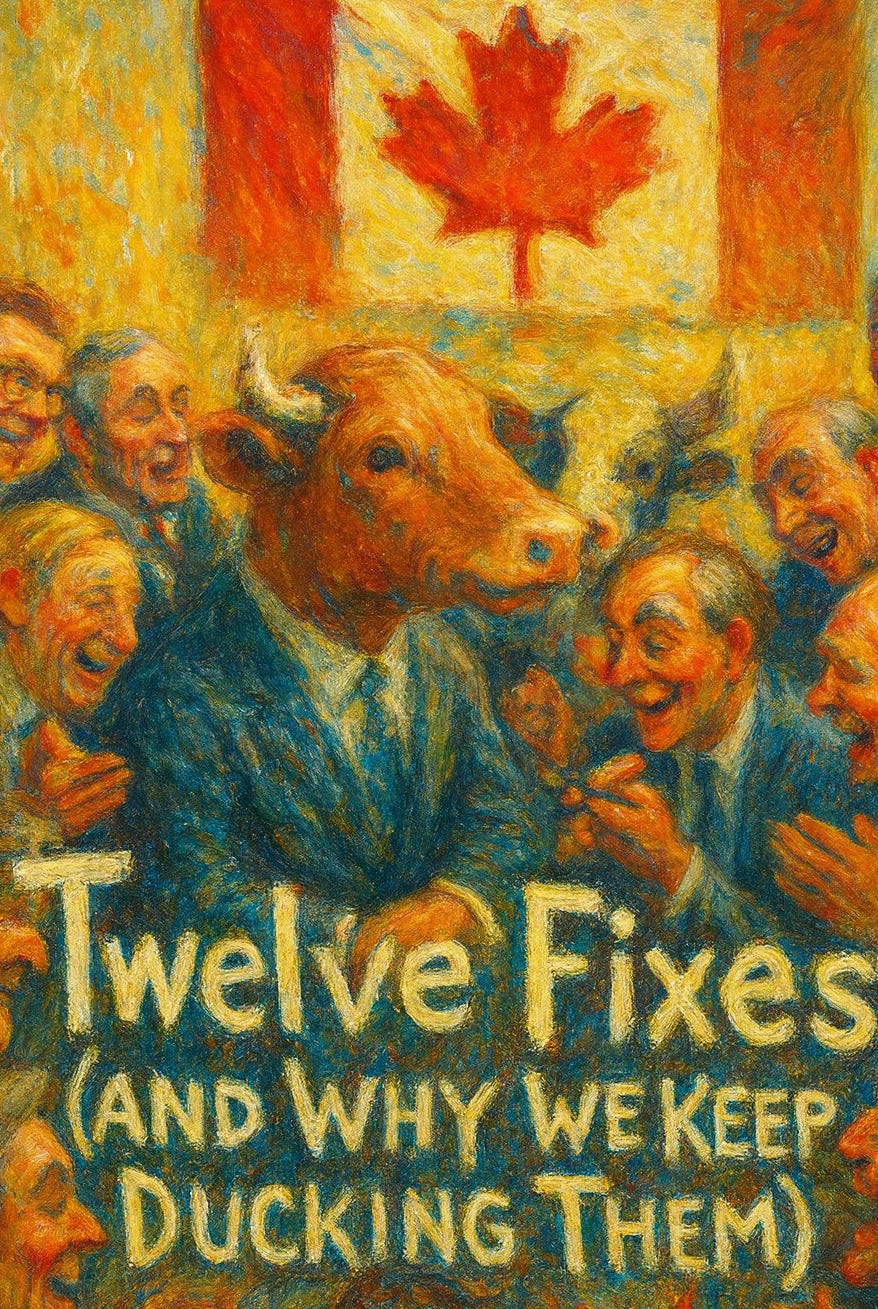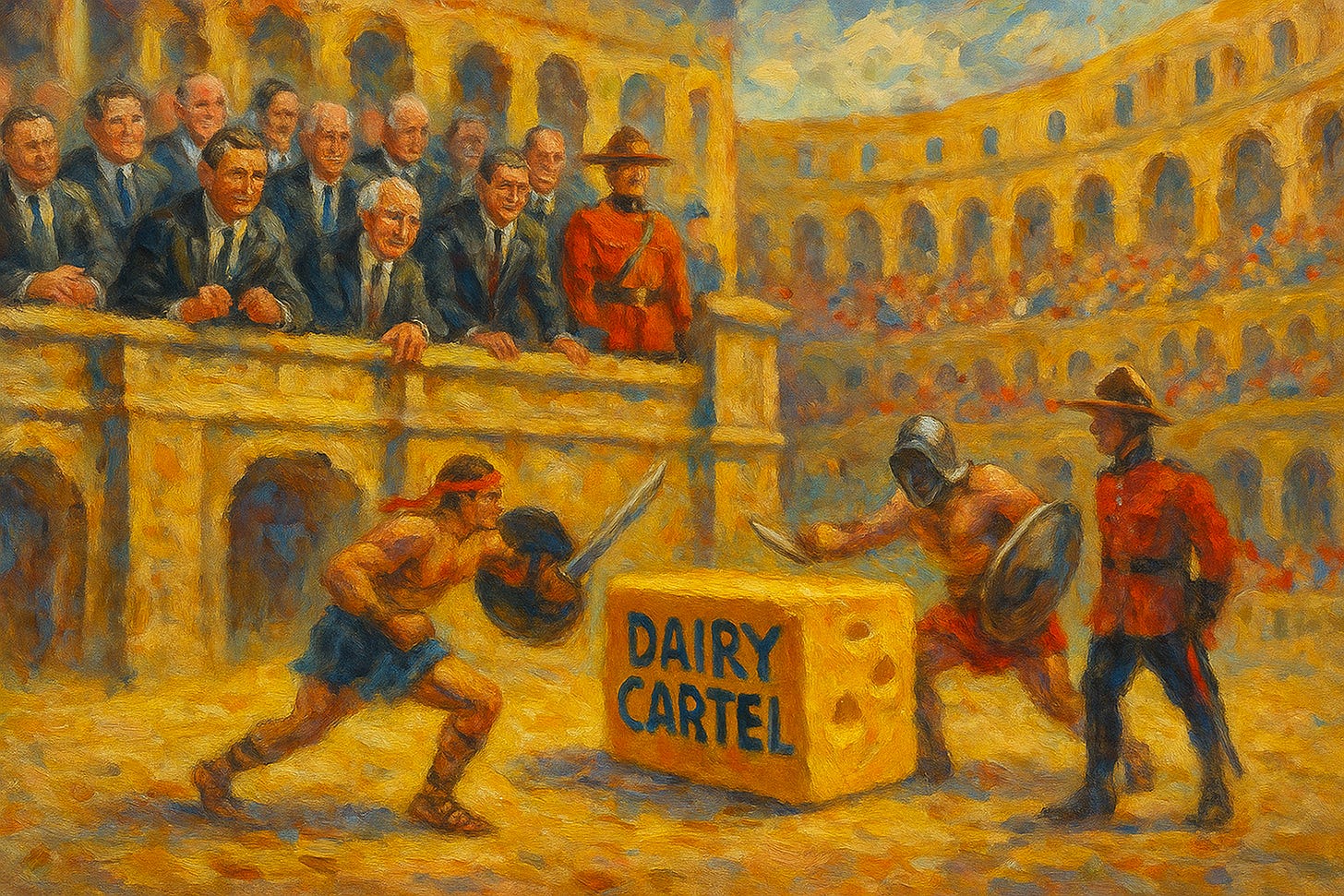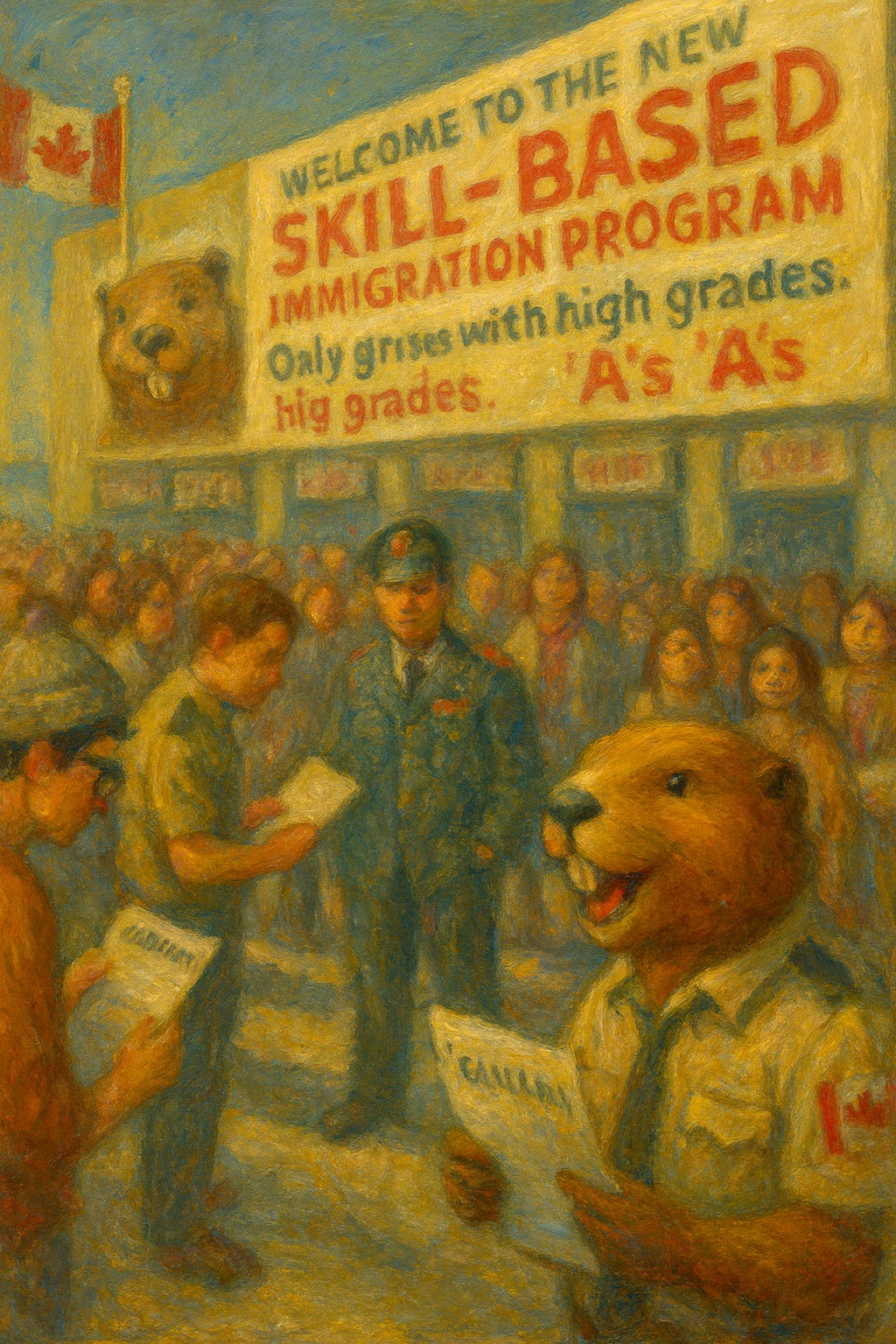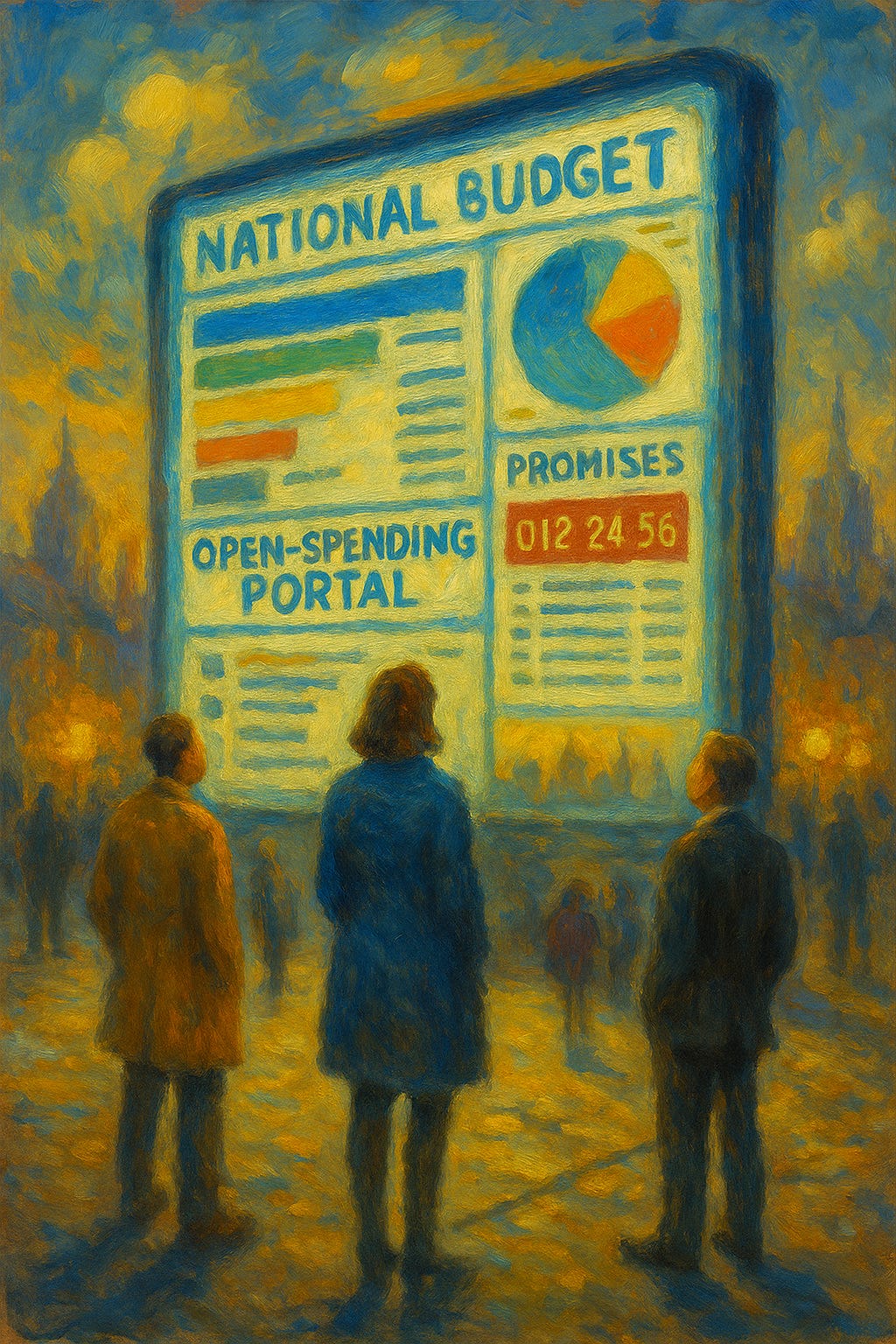The Man with the Nice Suit
A Bold Request For Canada To Address Twelve Areas.
If you believe in the importance of free speech, subscribe to support uncensored, fearless writing—the more people who pay, the more time I can devote to this.
Please subscribe to receive at least three pieces /essays per week with open comments. It’s $6 per month, less than USD 4. And now take 50% off.
Everyone says, "Hey, it’s just a cup of coffee," but please choose my coffee when you come to the Substack counter. Cheers.
Why Canadians are smitten with Prime Minister Carney—and what it says about parasocial politics, bread‑and‑circuses governance, and the distance between vibes and reality
Canada is the quarterback with the body of a Ferrari and the brain of a Mattel toy.
We sit on world‑class riches—top‑tier critical minerals, forests that could roof continents, oil and gas that the rest of the planet keeps buying no matter how loudly we scold it. Yet, we run our public life like a timid Home Owners Association.
We prefer the comfort of ritual to the risk of reform.
Enter Prime Minister Mark Carney: the immaculate suit, the practised calm, the glossy promise that managerial competence can be worn like a second skin.
The polls praise the posture; the cameras purr. It is the essence of parasocial politics: we don’t know the man, but we know the brand, and in an age that elects influencers, the brand votes itself.
Parasocial ties—one‑way emotional “relationships” with public figures—now shape ballots more than platforms. Ask Canadians about slogans and they’ll quote them; ask them to distinguish debt from deficit and many blink.
Once upon a time, you had to read a paper to know three cabinet ministers; now the answers are in your pocket, and somehow we know less. That isn’t because information is scarce; it’s because attention is.
We have the Library of Alexandria on a phone and spend the afternoon in the gift shop.
Bread and circuses are not the invention of our comms shops. Juvenal nailed it two millennia ago: panem et circenses.
Rome’s annona grain dole softened hard questions; the Circus Maximus turned governance into matinee entertainment; amphitheatres outsourced citizenship to cheers.
The crowd measured emperors by spectacle, not statute.
Today, Toronto can flirt with nine per cent unemployment and the city hums along because vibes are easier than pain.
Carney promises bigger defence budgets and a righteous posture on trade; on Monday, we will hit NATO’s 2 per cent this year; by Thursday, it’s “soon.” The suit reassures, the crowd applauds, and the hard arithmetic sulks in a corner.
If we want to swap theatre for outcomes, here are twelve fixes—big, unfashionable, measurable—and the reason each one keeps failing: not because we can’t, but because we won’t. Our national bad habit is to baptise yesterday’s drift as today’s prudence.
1) Treat Canada like one country, not twelve medieval fiefdoms
What to do: Drop interprovincial trade barriers. Internal frictions—mismatched truck rules, non‑portable credentials, protectionist procurement—act like a hidden tariff.
Serious estimates put the price penalty in the high single digits; deeper integration could add tens of billions to GDP, on the order of a couple of points of national output, the equivalent of thousands per household once supply chains re‑price. Mandate automatic mutual recognition of professional licences; put building, electrical, and trucking codes on a two‑year harmonisation clock; open federal procurement first to provinces that comply. Publish a monthly scoreboard naming who moved and who sulked.
Why it persists (the stupidity of it all): Because “that’s how we’ve always done it.” Vested interests. We worship the ritual of federalism more than the results of unity. Everyone says “Team Canada,” then insists on twelve sets of shoulder pads. Rome built roads; we build reasons.
2) Fix health care—progress, not false polarities
What to do: Okay, it’s provincial, but still.
End the silly catechism that the only models are ours or the United States. Most single‑payer countries allow parallel private options and still deliver universal care. Aim for a Norway‑style discipline: digital booking, public dashboards of waits, hard guarantees that if the public system can’t deliver in time, the patient is treated elsewhere at public expense.
Ottawa can’t run hospitals, but it can finance wait‑time reductions with iron‑clad incentives, fund interoperable health records, and require comparable reporting across provinces so citizens can see who is performing and who is posturing.
Why it persists: Because queues have clients. Consultants, administrators, and comfortable guilds make a living from bottlenecks. They don’t go on television to defend the delay; they just quietly keep it. We reassure ourselves that stasis is “equity,” and call that compassion.
3) Replace corporate giveaways with clean, broad tax fairness
What to do: End the ministerial habit of picking winners with cheques. Over many years, we’ve sprayed hundreds of billions at businesses in the name of “investment.”
Swap bespoke subsidies for across-the-board corporate rate cuts and red-tape reductions; sunset every special deal within five years; maintain a live registry of exceptions with hard kill dates; and subject all “strategic” programs to public cost-per-job metrics.
If we want more factories, make the environment predictably attractive for all of them—not just the ones whose executives had lunch with the minister.
Ireland’s success in attracting global investment wasn’t because they staged more photo ops; it was because they dropped their corporate tax rate to a globally competitive level and stuck with it.
The stability and predictability—not just the number—pulled in multinationals, built a tech sector, and raised per-capita GDP to one of the highest in the world.
Increase corporate taxes? They will just be passed down to workers and consumers through higher prices, lower wages, or smaller pension contributions. Lower, predictable rates across the board mean fewer distortions and more capital left to expand operations, hire, and innovate.
If we’re serious about raising productivity—and we should be, because productivity is the only sustainable engine of rising wages—we can’t keep pretending that importing millions of low-skill workers will somehow produce a tech boom. Your kid will just never be able to get hired at Tim Hortons.
That’s not immigration policy; that’s cargo-cult economics. Without targeted skills, capital investment, and incentives to automate and innovate, we’re just scaling up low-wage work and adding strain to housing, health care, and infrastructure.
Why it persists: Because ribbon-cuttings photograph better than rulebooks. Politicians like to be seen “bringing home” a factory; CFOs like being paid to do what they were going to do anyway. And voters, dazzled by the ceremony, accept the theatre because their grandkids pay the invoice.
4) Smash supply management—for cheese and democracy
What to do: Tear down the dairy/egg/chicken cartels that wall off breakfast—the current system taxes every family to enrich a few thousand quota‑holders. Buy out quotas with a declining bond, phase down tariffs, and support low‑income families directly during the transition.
Look at New Zealand: in the 1980s, they deregulated, cushioned the shift, and ended up with a more competitive, export‑dominant sector. Prices fell for consumers, and innovation rose for producers.
Why it persists: Because in Canada, the cows have better lobbyists than the kids. And because the defenders of the cartel are maestros at re‑selling the status quo in new packaging—“modernisation,” “family farm protection,” “food security.”
Also, one can only assume they keep a vault of kompromat: grainy VHS of ministers cavorting with Russian prostitutes while LARPing as Holsteins, mooing the Canada Dairy Commission’s annual report.
How else do a few thousand millionaires hold an entire political class hostage? Satire, yes—but the real absurdity is that we barely blush while the poorest pay more for milk.
5) Defence—match the suit to the steel
What to do: If we’re going to promise NATO’s 2 per cent, do it with a procurement plan, not a press release. Publish a transparent pipeline of ships, subs, munitions, and air defence with quarterly progress and penalties for slippage. Pre-authorise multi‑year appropriations that survive election seasons. Tie senior bonuses to delivery, not to announcements.
Why it persists: Because geopolitics is abstract until it isn’t. Voters like the sound of “strong” more than the bill for ships; governments prefer Ambition Month to Audit Day. Rome did not bluff its legions into being; it built them.
6) Intergenerational fairness—make politicians feel the deficit
What to do: Interest charges now devour eye‑watering sums every year across governments—money that hires no nurses and builds no homes. Institute a “Deficit Dock”: if the federal budget is in the red, MPs’ base pay automatically falls by the same percentage; if the books improve, their salaries can recover. Put a line on every tax return showing exactly how much of your taxes went to interest and your share of the total debt.
Why it persists: Because costs hidden in compound interest are easy to ignore. Voters don’t riot over basis points. Politicians mistake quiet for consent and call it “stability.”
7) Use our natural advantages—proudly, urgently, responsibly
What to do: Move projects from file to field. One‑permit‑per‑project; firm clocks on judicial review; carbon policy that rewards global emissions avoided. If Canadian LNG displaces coal in Asia, count those avoided tonnes and credit them. Build transmission where it unlocks resource regions. Treat miners, foresters, and energy workers as nation‑builders, not embarrassments.
Why it persists: Because apology is cheaper than action. We perform virtue locally and import vice globally, then congratulate ourselves on the performance. It is environmentalism by selfie.
8) Real competition isn’t a security threat—monopoly is
What to do: Open protected sectors to genuine competitors. Telecom, airlines, even retail banking: allow foreign entrants under reciprocal rules while ring‑fencing truly critical infrastructure. Spectrum policy should foster rivals, not protect old oligopolies. Consumers deserve lower prices earned by rivalry, not by regulator‑approved coupons.
Why it persists: Because cosy profits have friends. We are told protection is patriotic; really, it is parochial. Romans welcomed trade across their world; we treat the next tower over as national security.
9) Immigration by capacity—not by applause line
What to do: Set multi‑year intake targets tied to actual capacity in housing starts, primary‑care seats, and regional labour demand. Collapse dodgy “education‑to‑work” loopholes that serve as backdoors rather than pipelines.
Publish quarterly intake‑versus‑capacity dashboards by province. Honour refugees, prioritise skills, restore public confidence.
Why it persists: Because big numbers sound like big hearts. It is easier to moralise than to plan. Then voters discover the queue at the clinic, and support curdles.
10) Public‑service sprawl—freeze it, audit it, digitise it, expose it
What to do: Headcount and compensation have ballooned beyond private baselines. Impose a three‑year hiring freeze with surgical exceptions; launch a rolling, independent program audit with public “keep/kill/fix” verdicts; and build the national open‑spend portal that lets any citizen see any dollar in two clicks—recipient, contract, outcome.
Add a “Promise Tracker” with plain‑language pledges, start dates, target dates, and live countdown clocks. Missed milestones are flagged red and stay that way until delivered. Include an “Idiotic Spending of the Day” tile chosen by randomised citizen juries. Make sunlight the default.
Why it persists: Because bureaucracy is very good at hiding in plain sight. PDFs are published; accountability is not. We accept the login page because it looks official.
11) Indigenous opportunity—education, ownership, autonomy
What to do: Start with elite schooling access and fully funded post‑secondary pathways for Indigenous students who meet merit‑based thresholds, with robust cultural programming.
Pair that with property rights reforms (within community consent) that allow reserve lands to be used as collateral through First Nations’ financial institutions. Capital that cannot be leveraged is a museum piece; capital that can be leveraged is a ladder.
Why it persists: Because sentiment is cheaper than systems. We deliver land acknowledgements and starve the instruments that would build wealth. It is compassion by proclamation.
12) Education that works—not a credential factory
What to do (and yes, it’s provincial): Ottawa can’t write Grade 10 civics, but it can move a province. The federal government controls student loans, major research grants, Indigenous education transfers, and a good deal of post‑secondary infrastructure spending. Use that leverage to prod—not dictate—change.
Permit mission‑based charter schools and innovative academies within public systems, with autonomy on pedagogy, curriculum focus, and teacher hiring. Tie post‑secondary funding to outcomes: graduate employment rates, median earnings after five years, and loan‑repayment performance. If an institution consistently leaves students unemployable and indebted, the institution should share the cost.
A working precedent: Germany treats schooling as a Länder duty, but Berlin pushed the 2010s‑era Digitalpakt via federal co‑funding and standards that states had to meet to receive money. Finland—despite heavy municipal control—pulled off a national shift toward trust‑and‑competence‑based schooling in the 1990s by setting a vision and financing the transition.
Canada can do the same: pick a willing province (Alberta, New Brunswick, Saskatchewan—take your pick) and beta an “academic‑plus‑skills” model in which every graduate leaves secondary school with both a diploma and an industry‑vetted certificate (coding, welding, health care, logistics, green tech).
In exchange for federal funds, the province agrees to public, annual performance reporting—including graduate employment and employer satisfaction surveys—and independent evaluation after three years.
Why it persists: Because we confuse ceremony with substance. Degrees feel like education; skills are education. We prefer the photo of the mortarboard to the audit of learning. Critical thinking isn’t a sentiment; it’s civic armour—and we keep issuing paper shields.
Radical Transparency: The Portal That Kills the Circus
Bread and circuses flourish in the dark; they wilt under floodlights. Create a third‑party, legally arm’s‑length transparency agency—chartered like an auditor‑general for data—to run a national open‑budget portal that spans federal, provincial, territorial, and (where agreements exist) municipal spending. Program, supplier, riding, and timeline can drill down to every dollar.
Promise pages carry cost forecasts, deliverables, and countdown clocks. Break a milestone, and it flashes red. Citizens can subscribe to their riding’s feed; journalists can scrape the lot. There is precedent abroad—countries with open contracting and live procurement dashboards—but Canada needs the whole pane of glass: one site to end the ritual of “we’ll get back to you.”
Unemployment Is Not About Americano vs. Small Tims
Joblessness doesn’t just dent GDP; it shreds lives. When unemployment rises, depression and substance abuse rise with it; so do family breakdowns, violent crime, and suicides—even modest increases in unemployment show measurable upticks in self‑harm.
Youth joblessness is a time bomb disguised as a gap year. We treat the economy like a menu choice—Americano or small Tim—when it is, in fact, the difference between a family holding together and a family falling apart.
The Romans fed grain because they knew despair breeds chaos. We hand out platitudes and wonder why the numbers don’t move.
Unemployment kills more than wallets; it steals futures
In July 2025, Canada lost 40,800 jobs; youth unemployment hit 14.6%. Globally, a 1% unemployment rise correlates with nearly double suicide odds and spikes in crime. Canada’s economic hardship translates into 100–200 extra suicides annually.
This isn’t latte vs. amid—it’s panic and peril.
The Hard Part: It Isn’t Just Them. It’s Us.
It is easy to blame politicians and the media. But we elect the leaders, and we click the content we prefer. We elect influencers, not politicians and managers.
The internet should have made us more informed; instead, it has gamified distraction. A famous line ascribed to Joseph de Maistre says that every nation gets the government it deserves.
Another, often hung (rightly or wrongly) on Churchill, calls the five‑minute chat with the average voter the best argument against democracy.
It turns out our voters haven’t always been dulled, but the decline is real—and spectacular. In the U.S., more than 70 percent fail a basic civic quiz: name the three branches of government or the number of Supreme Court justices, and you’re flunked .
Here in Canada, youth hit only about 2.6 out of 7 correct civic-knowledge questions (versus 2.9 for older adults) - so boomers shouldn’t get all cocky when they start putting up their elbows.
And compared to 30 years ago, turnout has fallen from a post-war average of 75 percent to the low 60s today. In short, we are not a robust democracy of citizens but a democracy of spectators—content to click, not to think.
Take the spirit, not the snobbery: democracies live or die by the seriousness of their citizens. If we want fewer circuses, we have to stop buying tickets.
Canada is rich enough to do better. We have the Ferrari body; we can grow the brain. But that requires leaders willing to pick fights with interests that fight back—and citizens willing to notice.
It means measuring waits, not announcing task forces; cutting cheques to patients, not to lobbyists; buying ships, not slogans; letting competition lower bills; letting miners, coders, nurses, teachers, and builders get on with the work without wearing a hairshirt for it.
We elect the culture. If we prefer the show, we will get the show—and one day the tent will come down and we will wonder where the bread went.
But suppose we demand the scoreboard, the portal, the harmonised market, the measurable care, the end of subsidies for favourites, the courage to tear down the dairy wall, the honesty about debt, and the schools that teach thinking rather than merely awarding parchment.
In that case, the parasocial bond might, at last, become a social contract.
The suit can stay. The substance must arrive.
If you found value in this article and wish to support my ongoing work, please consider leaving a tip. Your support helps me continue producing uncensored content on critical issues.


















A logical and sensible plan. I would add making Parliamentary pensions defined contribution plans rather than defined benefits plans with full indexing vs inflation and full vesting after only six years. If MP remuneration was in the real world, they might have a bit more appreciation for the folks they’re supposed to be representing. You may recall that the first thing they did when the House reconvened post-Covid was to give themselves a raise.
Separate point, in my lifetime I would say Brian Mulroney and free trade meets your criteria. The rhetoric against free trade was over the top, disaster was on our doorstep, but Mulroney, supported by an election win, marched forward and the country was better for it.